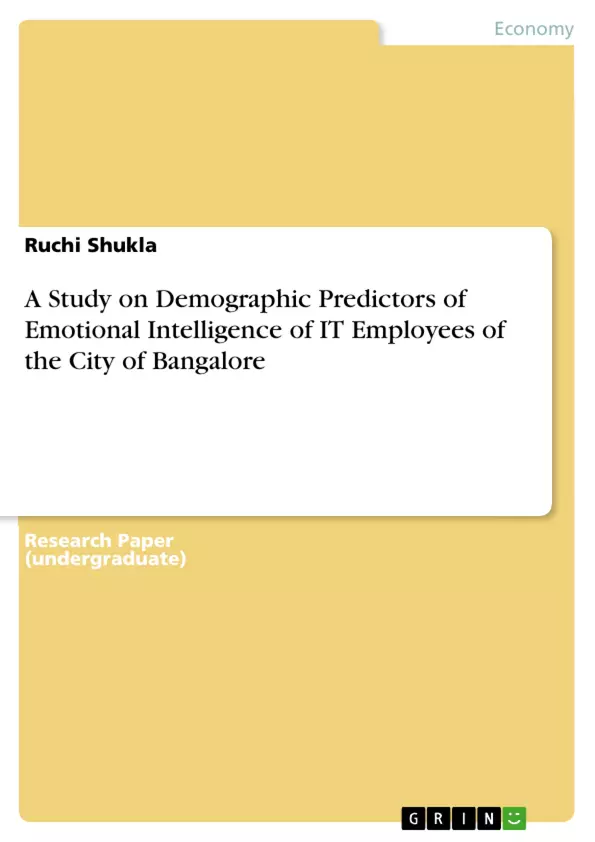The present study investigates the relationship between tenure of service, age, and emotional intelligence of working personnel. The study is based on the responses provided by IT personnel working in the city of Bangalore. The study examines performance, work-life balance, and workplace-related emotional intelligence. The number of years a person has worked affects their emotional intelligence, and age also influences emotional intelligence.
Regardless of gender, a survey consisting of 30 Likert-scale questions was distributed via email. The responses were analyzed, and the degree of variation (SD) was calculated. A hypothesis was tested to analyze the relationship between emotional intelligence and the years of experience, as well as the age of the respondents when they started their jobs. The research concluded that emotional intelligence has a positive relationship with years of experience, while it shows a reverse relationship with the age of the respondent. Additionally, a descriptive study was conducted based on the collected data.
Inhaltsverzeichnis (Table of Contents)
- I. INTRODUCTION
- 1.1 Problem Statement:
- 1.2 Objectives of The Study
- II. LITERATURE REVIEW
Zielsetzung und Themenschwerpunkte (Objectives and Key Themes)
The main objective of this study is to investigate the relationship between tenure of service and age, and emotional intelligence among IT employees in Bangalore. The study aims to analyze the impact of employee experience on organizational performance and explore the descriptive statistics related to gender, age, years of service, and emotional intelligence.
- Emotional Intelligence in the IT Sector
- Impact of Experience on Performance
- Demographic Factors and Emotional Intelligence
- Relationship between Age, Tenure, and Emotional Intelligence
- Descriptive Analysis of Emotional Intelligence
Zusammenfassung der Kapitel (Chapter Summaries)
I. INTRODUCTION: This introductory chapter sets the stage for the research by highlighting the significance of the IT industry in India's economy and emphasizing the importance of understanding factors influencing employee performance. It defines emotional intelligence (EQ) and its components, linking it to employee satisfaction, decision-making, and workplace harmony. The chapter clearly states the problem the study addresses: exploring the relationship between emotional intelligence and years of experience and age at job entry within the IT sector. It lists challenges faced by employees, such as maintaining a positive outlook, adapting to new environments, handling stress, and effectively expressing emotions. Finally, it outlines the study's objectives, focusing on analyzing the relationship between emotional intelligence, years of service, age, and organizational performance, including a descriptive analysis of the collected data.
II. LITERATURE REVIEW: This chapter presents a review of existing literature on emotional intelligence and its connection to various aspects of work performance and employee characteristics. Multiple studies are summarized, highlighting the methodologies employed (e.g., t-tests, Pearson correlation, ANOVA) and their findings on the relationships between emotional intelligence, work performance, employee turnover, working conditions, and demographic factors. The literature review demonstrates a variety of research approaches and settings, showing the complex interplay of factors that influence emotional intelligence and its impact in different professional contexts. The diverse findings demonstrate the necessity for further research in this area, particularly within the context of the IT industry in Bangalore. The analysis of previous studies provides a robust foundation for the current study, clearly identifying areas for further investigation.
Schlüsselwörter (Keywords)
Emotional Intelligence, IT Employees, Bangalore, Job Performance, Years of Experience, Age, Demographic Factors, Work-Life Balance, Workplace Satisfaction.
Häufig gestellte Fragen
What is the primary objective of the study?
The main objective of this study is to investigate the relationship between tenure of service and age, and emotional intelligence among IT employees in Bangalore. The study also aims to analyze the impact of employee experience on organizational performance and explore descriptive statistics related to gender, age, years of service, and emotional intelligence.
What are the key themes of the study?
The key themes are Emotional Intelligence in the IT Sector, Impact of Experience on Performance, Demographic Factors and Emotional Intelligence, Relationship between Age, Tenure, and Emotional Intelligence, and Descriptive Analysis of Emotional Intelligence.
What does the introduction chapter cover?
The introductory chapter highlights the significance of the IT industry in India's economy and emphasizes the importance of understanding factors influencing employee performance. It defines emotional intelligence (EQ) and its components, linking it to employee satisfaction, decision-making, and workplace harmony. It states the problem addressed: exploring the relationship between emotional intelligence and years of experience and age at job entry within the IT sector. It lists challenges faced by employees and outlines the study's objectives, focusing on analyzing the relationship between emotional intelligence, years of service, age, and organizational performance, including a descriptive analysis of the collected data.
What does the literature review chapter cover?
The literature review presents a review of existing literature on emotional intelligence and its connection to various aspects of work performance and employee characteristics. It summarizes multiple studies, highlighting methodologies and findings on the relationships between emotional intelligence, work performance, employee turnover, working conditions, and demographic factors. It demonstrates a variety of research approaches and settings, showing the complex interplay of factors that influence emotional intelligence and its impact in different professional contexts. It identifies areas for further investigation.
What are the keywords associated with this study?
The keywords are Emotional Intelligence, IT Employees, Bangalore, Job Performance, Years of Experience, Age, Demographic Factors, Work-Life Balance, Workplace Satisfaction.
What methodologies were used in the studies summarized in the literature review?
Methodologies used in the studies summarized in the literature review include t-tests, Pearson correlation, and ANOVA.
Why is this study being conducted in Bangalore's IT sector?
The study is being conducted in Bangalore's IT sector because the IT industry is significant to India's economy, and understanding the factors that influence employee performance within this sector is important.
- Quote paper
- Ruchi Shukla (Author), 2024, A Study on Demographic Predictors of Emotional Intelligence of IT Employees of the City of Bangalore, Munich, GRIN Verlag, https://www.grin.com/document/1519996



